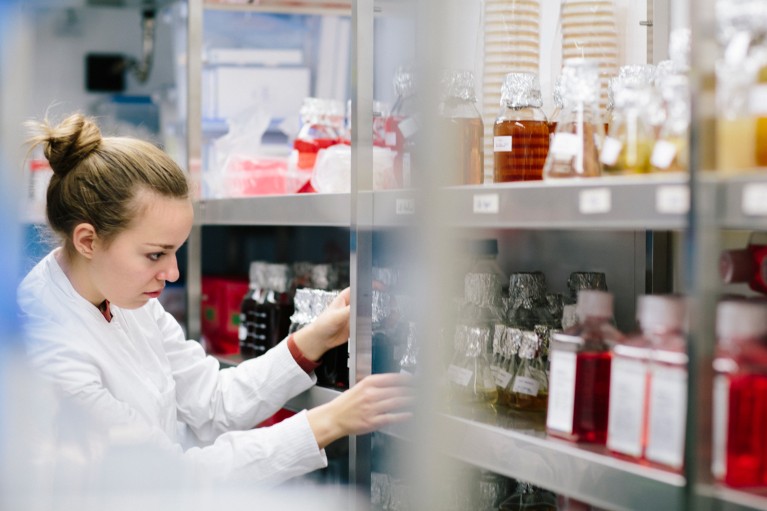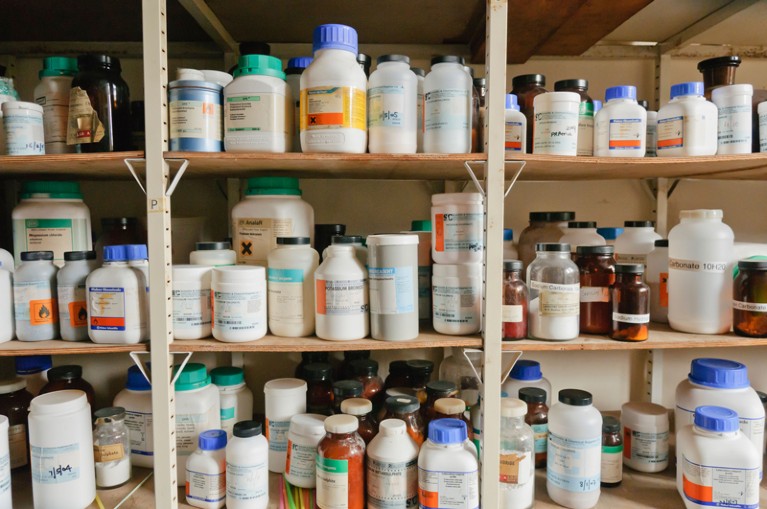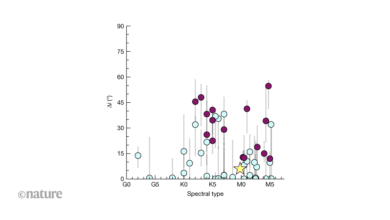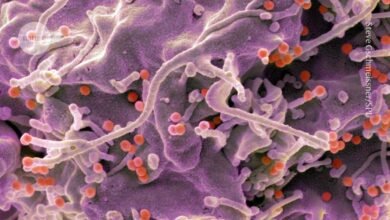

Even if their best-before dates have passed, some materials can still be used — and doing so is often a cost-conscious choice.Credit: Getty
Everyone has at one time or another grabbed something out of the fridge or store cupboard, only to find that its use-by date is long past. It still looks good, and it smells OK. Should you throw it out? For most of us, the item in question might be milk, eggs or cereal. For Giorgio Cattoretti, it was antibodies.
Cattoretti has travelled the world with his antibodies. He started collecting them in the early 1990s at the National Cancer Institute of Milan in Italy for his studies in immunology and oncology, and brought them with him when he moved to the United States in 1994. “They stayed in the fridge for 13 years in the US, and then I shipped them back to Italy,” says Cattoretti, a now-retired pathologist whose most recent appointment was at the University of Milano-Bicocca in Italy. “And they kept working.”
Cattoretti held on to those antibodies for both sentimental and practical reasons: some were unique clones that were no longer available, others were simply too costly to replace. But, according to their best-before dates, many had been expired for more than a decade.
Whether a reagent is still usable after its expiration date is a question that researchers often ask. Social-media websites, such as Reddit and ResearchGate, are full of discussions sparked by posts such as: “How seriously do you take chemical expiry dates?” and “Do PCR reagents really expire?”
The answer is: sometimes. Certain reagents will still work just fine, so using them can be both financially savvy and environmentally friendly. But scientists must rely on intuition, experience and the right tests to make sure that outdated materials are working properly.
Unexpectedly long life
The laboratory in which Sofia Kinton earned her doctorate at Northeastern University in Boston, Massachusetts, had a large collection of restriction enzymes — proteins used to cleave DNA at specific sites — many of which were old and seldom used. “My [principal investigator] was a classic hoarder,” Kinton jokes. “He never threw anything out.”
One day, a student from a neighbouring lab asked to borrow one. “We discovered that the enzyme was from the 1990s, making it one year older than she was,” says Kinton, who is now a research scientist at the pharmaceutical company Sanofi in Boston. The enzyme had been expired for decades. “She tried it anyway, and it still worked.”
A handful of studies have explored reagent longevity. About a decade ago, for example, Cattoretti and his colleagues put some of the oldest antibodies in their lab fridges to the test1. They assessed three dozen antibodies that were 12–26 years past their expiration date and found that 34 still worked correctly in immunohistochemistry experiments, in which antibodies are used to highlight specific markers in thin slices of tissue. Other more recent studies have similarly found that antibodies can be used long beyond the manufacturers’ best-before dates — some as many as 21 years later2.
For Stephen Bustin, a molecular biologist at Anglia Ruskin University in Cambridge, UK, a similar study of PCR master mixes, which are premixed blends of reagents used to amplify nucleic acids, was motivated by the funding drought that UK researchers experienced in the wake of the country’s exit from the European Union in 2020. Bustin and his team came to two conclusions: the master mixes worked long after their expiry date — more than seven years, in one case — and they could be used at lower concentrations than recommended, to stretch the supply3.

Some reagents still work well for decades after they have expired.Credit: Stephen Barnes/Science/Alamy
Academics often decide to keep — and use — expired reagents for both financial and practical reasons, Bustin says. For instance, because many researchers buy materials in bulk near the end of the fiscal year to spend the remainder of their lab budgets, many reagents sit for long periods before they are used up. “I’m using master mixes that are from around 2007,” he says.
Fabian List, who in 2023 completed his PhD in entomology at Texas A&M University in College Station, says that he used a PCR master mix that had expired five years earlier to complete his dissertation research. “In my experience, it was quite common to use expired reagents,” says List, who now works at the pest-control company APC in Hamburg, Germany. If materials are stored correctly — that is, according to the manufacturer’s recommendations — and remain undisturbed, “they normally last much longer than you would expect”, he adds.
Setting a date
To establish a product’s best-before date, manufacturers typically perform a battery of tests. This includes placing the material under various conditions — different temperatures, for example — and assessing how its physical parameters, such as pH and conductivity, and performance in a typical experiment change over time, explains Markus Spregner-Haussels, vice-president of product development at Qiagen, a scientific-reagent manufacturer with headquarters in Venlo, the Netherlands. Companies also often stress-test their products — for instance, under very high temperatures — to determine their shelf life.
Other methods, such as examining historical data and ongoing monitoring of reagent performance, are used, too, says Lívia Guadaim, a communications business partner for global science and lab solutions at Merck, a life-sciences reagent manufacturer headquartered in Rahway, New Jersey.
If a reagent is expired, that doesn’t necessarily mean that it will stop working immediately, but its performance will usually decline over time, Spregner-Haussels says. “With the shelf life we indicate on our products, we are guaranteeing that they are good, even in worst-case scenarios, as long as you use the product as described,” he says. “If people use them longer than this, then it’s an off-label use and we simply cannot guarantee the performance.”
Storage conditions such as temperature, humidity and light exposure can affect reagent lifespan. Certain chemicals, such as salts, can last almost indefinitely if stored properly, says Mikael Kubista, a biochemist at the Institute of Biotechnology of the Czech Academy of Sciences in Vestec. “When I was a trainee, we had chemicals that had been ordered 20, 30 years earlier by previous professors, and they were often working fine.”
The nature of the study can also determine how efficient a reagent needs to be. If a scientist is simply isolating genomic DNA from blood, a high PCR yield might not be crucial — so a lower-performing reagent could suffice. However, if a researcher is trying to nail down the culprit behind a rare infection, with only a few copies of viral DNA present in the sample, it’s much more important to use reagents at peak performance.
Kinton says that the case of the student borrowing an expired enzyme was a good example of when to use such a reagent — testing the enzyme’s validity took only an hour or two, and the study had low stakes. “There’s really not a downside to attempting it,” Kinton says. “If it’s a situation where it’s a more precious sample or there’s a more urgent need, we might be more cautious.”
To use or not to use?
To extend a the lifespan of a reagent, researchers should consider not only storage factors such as light, temperature and humidity, but also preparation methods. Buffers, for instance, can influence the stability of PCR primers and probes, Kubista says. It’s also important to avoid freezing and thawing reagents several times, he adds. “Typically, we freeze them in aliquots, so we only have to thaw them once, because freeze–thawing degrades material.”
Also consider the containers in which materials are stored. Some reagents come in plastic containers that can become brittle if handled infrequently, says Ann Ehrenhofer-Murray, a molecular biologist at the Humboldt University of Berlin, who, like Cattoretti, has held onto antibodies that are decades old. “That’s a reason to throw it away — not because the due date is out.”
There are, however, some settings, such as clinical diagnostics and clinical trials, in which rules around expiration dates are much stricter. Many researchers say that, outside these situations, it’s perfectly fine to use your old reagent — even if it’s more than two decades past expiry — as long as tests show that it can still do the job that it was designed for.
Kubista’s advice: test the reagent on a previously analysed sample or compare it with a newly purchased, non-expired version, to see whether it still works as intended. And repeat that experiment several times, he adds — that’s just good science. “If the reproducibility is satisfactory with the expired reagent, it’s usually fine to use.”
Source link







